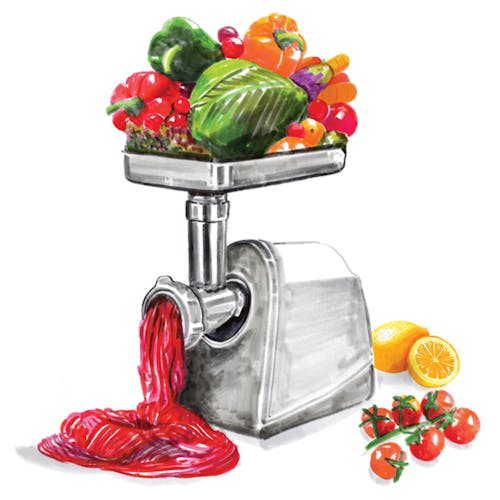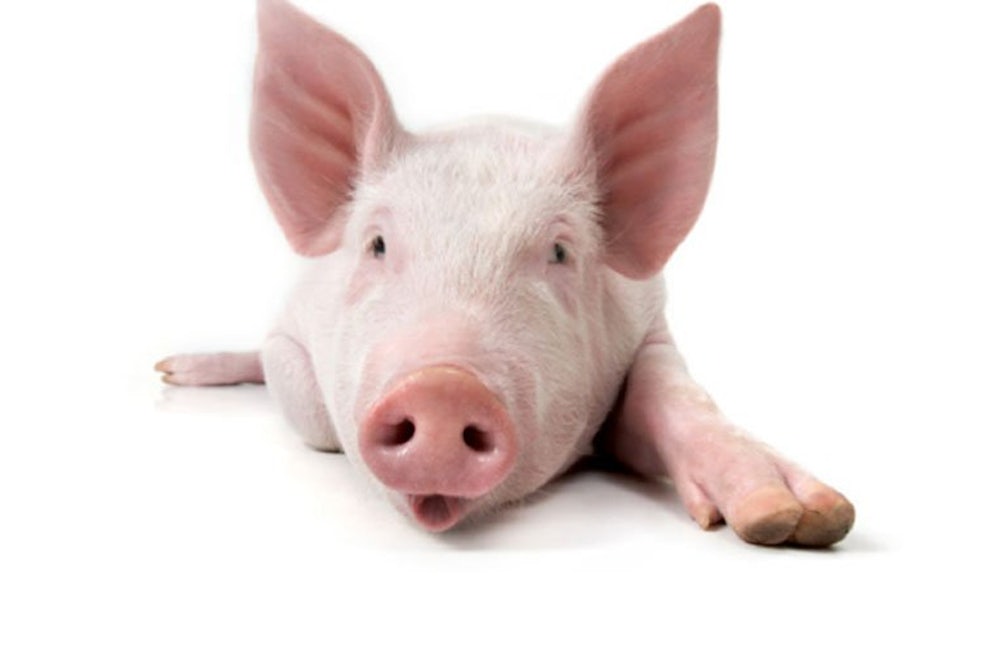Underlying the ongoing search for protein sources that look and taste like meat but are in fact made from, say, yellow peas is the assumption that the industrial food system is broken—that eating animals, the title of Jonathan Safran Foer’s 2009 book, is deeply destructive to the planet’s water supply, its air, and its land, which could be put to better and gentler use. And it’s destructive to our ethics and personal code of honor: We hurt ourselves when we eat animals killed for our satisfaction.
I eat meat. However relatively evolved meatless meat may be—and I recently spent a few months researching and sampling the latest iterations—nothing matches the primeval pleasure of gnawing at ribs. Besides, I’m a restaurant critic in two cities, Boston and Atlanta, and eating meat is a professional obligation. Is it time to reexamine my own conscience, as Foer’s book, so airlessly sure of itself, failed to make me do? Several new books made me think so, particularly books that detail the toll that factory farming—of pigs, particularly—takes on the environment and on animals, and on workers and health.
When Barry Estabrook announced the subject of his latest book to his partner, she sighed and asked, “Does this mean I’ll have to give up eating bacon?” His answer was no. Early in Pig Tales: An Omnivore’s Quest for Sustainable Meat, Estabrook’s spare, engagingly narrated book, he introduces a preternaturally intuitive pig so empathetic it could be a low-cost therapist. (Last year I accompanied New Yorker contributor Patricia Marx to tea at The Four Seasons in Boston with a pig she claimed was an emotional support animal, to see how much she could get away with. The answer was a lot. People love pigs, dead and alive.) Few would rush it to the barbecue.

Estabrook covers worker injury and water and air pollution. But his heart is with the animals. Pig Tales is animated by Estabrook’s affection for pigs, and the book makes you eager to find the farmer who can give such a noble animal a better—an outright happy—life. Estabrook is naturally optimistic, finding heartening evidence in the insistence on animal welfare behind the purchasing decisions of Steve Ells, founder and co-CEO of Chipotle, and in consumer demand for more ethically raised animals. He sees a pastoral solution in small-scale artisans—a solution that will let his partner, and the reader, continue to eat bacon.
But can we? Ted Genoways’s investigative reporting is angry, and he wants you to be angry, too. The inescapable theme of The Chain: Farm, Factory, and the Fate of Our Food is the appalling stories of workers in a Hormel pig-slaughtering plant in Austin, Minnesota, who are permanently incapacitated, maimed, harassed, and hoodwinked. As Genoways (who writes in this issue of the New Republic about Chinese espionage on American corn seed research) sees it, everyone in the chain is trapped. The meat-factory town sees immigrants take once-protected jobs for lower wages. Unions see companies reconfigure themselves in corporate sleights of hand that enable faceless owners to run half a plant as a non-union shop, denying benefits and insurance to workers all but certain to get injured. Workers dread the day HR will discover they have been working under false papers and deny them workmen’s comp for on-the-job injuries—injuries the book describes in wrenching detail. Farmers are trapped by the increasingly stringent requirements of Hormel for the size and fat distribution of the pigs they buy, unable to pay off the grow-or-die loans.
Genoways doesn’t hunt out bad actors to blame. The production system and capitalism itself are under indictment. His heart is with the workers, who try and unnecessarily fail to keep working without serious injury as Hormel constantly ratchets up line speeds so that an impossible number of pigs per hour are supposed to be hacked and gouged into meat. Well into the book Genoways does get to the well-publicized cases of animal abuse, specifying what two undercover PETA workers filmed at Iowa pig factories and posted around the world. He even has compassion for the “overmatched and undertrained” workers who take out their frustrations on animals, violently.
You get almost as angry at the way corporate demands for ever-faster production lead to animal abuse as you get at the way corporate speed and profit demands lead to worker abuse. And you have to save some anger for the USDA, which sanctions a meat-industry demonstration project that lets greedy corporations determine production-line speeds. But don’t look for helpful remedial suggestions. Genoways isn’t interested in the kinds of eating choices Estabrook thinks can help combat industrial farming. The only way out of the labor and animal abuse he disturbingly reports is to stop buying any industrial meat products—something he knows won’t happen, especially when the Chinese market begins dictating the practices of the American pork industry. China’s doing that already, when it isn’t buying the U.S. pork industry, as it bought Smithfield in 2013. Genoways sees little remedy for a system that is stacked at every turn against the workers, the animals it raises too fast and too intensively with too little help, and even against medium-scale factory owners trying to stay alive.
Estabrook fondly thinks we can vote with our forks. The respect farmers show well-raised animals, preferably animals bred and permitted to have full lives, translates into respect on our part for both the farmers trying to survive and replenish their land and the animals they raise—and, yes, kill—for our pleasure.
Try arguing for humanely raised animals, for the small scale, for restoring economic balance and the power of smallholders to a more communal economy with James McWilliams, an agricultural historian and activist and author of the recent Modern Savage: Our Unthinking Decision to Eat Animals. He’ll just tell you you’re ignoring original sin. McWilliams is scorching and relentless and he hits you where you live. “Small farms that raise animals with dignity,” he writes, “are the good guys, we are told. ... Forget that, at the end of the day, they have the same blood on their hands as the factory farmer. ... Ignore that all the meat we eat comes from an animal that did not want to be killed.” Even if he gets in his own way by repeating himself so often, he does shake us out of our 1 percent complacency.
The suffering and damage to the earth that drives McWilliams to advocate veganism in his book and his posts on his site The Daily Pitchfork are founding motives for the owners of the two companies I visited while reporting on fake meat: Beyond Meat, which makes chicken strips, “crumbles” that plausibly substitute for ground meat, and a remarkably meaty Beast burger; and Hampton Creek, which makes Just Mayo, a shelf-stable, eggless mayonnaise substitute that has caught on for its neutral flavor, low price, and snappy marketing. Both companies assiduously avoid targeting the minuscule vegan market, aiming instead at the masses whose buying power can actually put a dent into the industrial food system to which they present an alternative—they’re not aiming at the socially conscious. The technology that underlies both companies (Hampton Creek calls itself a tech company) appeals, too, to Bill Gates, Peter Thiel, Ev Williams, Biz Stone, and the other Silicon Valley magnates who are investing in these and other companies, which aim to replace what Gates calls the colossally inefficient and antiquated way we produce food.
The 1 percent, like the poor, will always be with us, however wide a net the new alternative-meat companies cast. And they are another Achilles’ heel in the sputtering local-sustainable defense McWilliams derides. It’s true that calls to look your farmer, if not your dinner, in the eye and to know the provenance of every bit of food that crosses your sacred threshold smack of the insufferable assumption that you have the time and the money to go out and befriend them. But take a look at the significant announcements that McDonald’s has made with eggs and gestation crates for pigs, which Burger King, Costco, Kroger, Safeway, Target, Wendy’s, and even Hormel have followed in varying degrees. These came about, as other improvements come about, from the 1 percent who change their buying habits. Many other percentage points follow.
And if I can’t defend my innate elitism, I can defend my tribe. Narratives matter. Books and articles and news reports change behavior. They changed mine. At the start of my magazine career I edited an article about chicken-processing plants and was so sickened that for decades I ate no chicken whose origins I didn’t know; you likely made the same choice if you saw Frontline’s “The Trouble With Chicken” this past May. As it happened, I hadn’t had a fast-food burger in a long time before reading Fast Food Nation, but Eric Schlosser certainly persuaded me to never eat commercial ground meat again. Estabrook and Genoways have made me wary of commercial pork and bacon in a way I never was, even if I’d once flown to Iowa to see big- and small-scale pork production and observed the vast difference in creature comforts and resulting flavor.
Maybe it will be a narrative, then, that will make me give up meat. (We’ll certainly need the equivalents of Schlosser, Estabrook, and Genoways to report on China and India, which will more than make up for any reduced U.S. consumption.) I’ll keep making decisions as I find new information—and the kind that gets me, as I suspect gets most people, has a story attached. Like Estabrook, I’m an optimist. I do think that my own awareness and buying decisions can be part of much larger change. McWilliams has certainly forced me to examine my own smug do-goodism and likely moral hypocrisy. For now, though, I intend to keep making, day by day and month by month, what he would doubtless tell me is a devil’s bargain.
